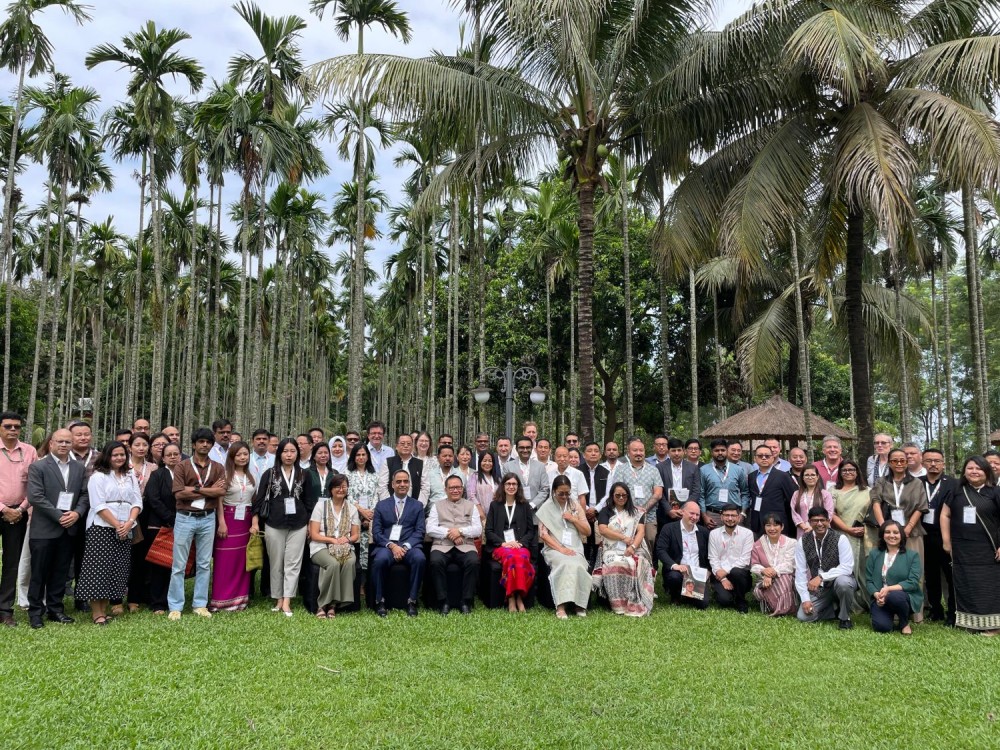Nagaland Deputy Chief Minister, TR Zeliang, and Senior Health Specialist, World Bank, Marion Jane Cros, with delegates at the Health Financing Forum for Cross-State Learning in the Northeast in Chümoukedima on October 7. (Morung Photo)

Health Financing Forum for Cross-State Learning explores ways
Morung Express News
Dimapur | October 7
Can the Northeast (NE) Indian states, often perceived as remote and underserved, offer a roadmap for achieving universal health coverage country-wide? Senior Health Specialist at the World Bank, Marion Jane Cros thinks so.
Cros is in Nagaland attending a two-day conclave called the ‘Health Financing Forum for Cross-State Learning in the Northeast,’ organised by the Nagaland state government in collaboration with the World Bank, which started in Chümoukedima on October 7. Deputy Chief Minister, TR Zeliang was also present at the inaugural of the forum, which the state Health & Family Welfare Department described as a “Platform to share experiences, disseminate key findings, and foster mutual learning on health financing reforms and universal health coverage across the Northeastern states.”
Cros said that the forum brings to together policymakers from the Northeast, as well from outside the region, aimed at dissecting the region’s perceived healthcare innovations led by Nagaland and Mizoram.
According to her, the NE states have been quietly building some impressive and potentially replicable models for health financing. She cited Nagaland’s Chief Minister’s Health Insurance Scheme (CMHIS) and Mizoram’s Mizoram Universal Healthcare Scheme, and said that they are in the region to understand what is working and how those lessons can be applied on a larger scale.
“The Northeast actually offers very important lessons. These are not widely well-known, but can actually help guide other Indian states and even other countries… towards universal (health insurance) coverage,” said Cros, who is an economist specialising in health financing policy and analytics.
Despite facing challenges like difficult terrain, limited resources, and “historically low health spending,” she held that the region has demonstrated resilience, and a very strong community spirit, while making notable progress.
According to her, very few Indian states have managed actually pilot Result-based Financing (RBF), a system that ties payments to healthcare providers to improved health outcomes.
She said that the goal of the conclave is to exchange real-world experience and research on universal health coverage and health financing, sharing what has worked, as well as, what has not worked. “We really want this discussion to be meaningful, honest, and even provocative,” she added.
Deputy Chief Minister, TR Zeliang, in his address Zeliang highlighted the unique challenges faced by the Northeast region, home to over 52 million people. He said that the region shows potential but continues to face structural challenges that constrain growth and equitable development.
He expressed hope that the conclave would not be a one-off affair, but rather the beginning of a new phase of cooperation, “One where data, evidence and dialogue drive policy.”
He said, “I hope we use this opportunity to identify what works best in different contexts across the region, to strengthen collaboration between health, finance, and planning departments and chart a shared roadmap for scaling up reforms that move us closer to universal health coverage.”
According to him, the road to universal health coverage in the NE is within reach, provided “We continue to innovate, learn from one another, and invest in systems that place people, especially the most vulnerable, at the center.”
He said that the forum should be remembered as the moment when the Northeast came together to build a shared vision and healthy, more resilient future.






